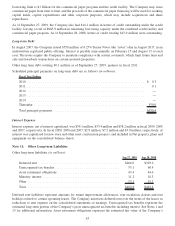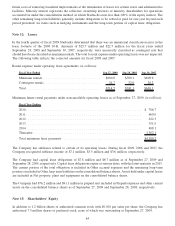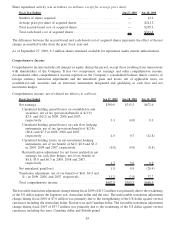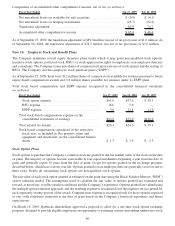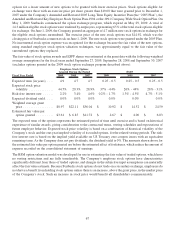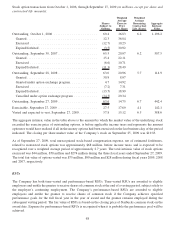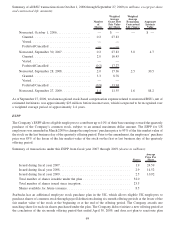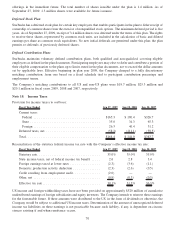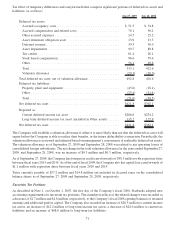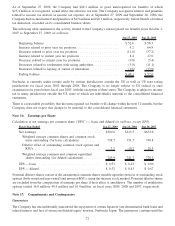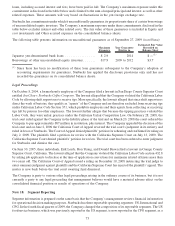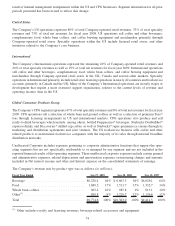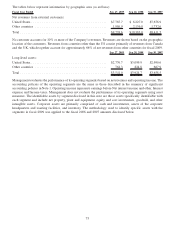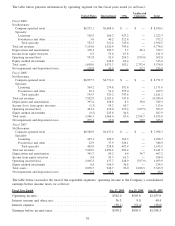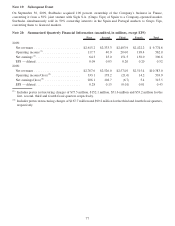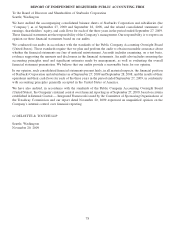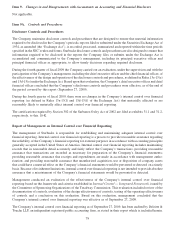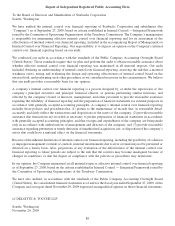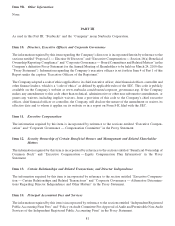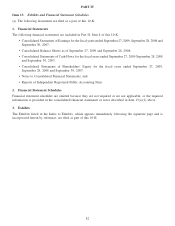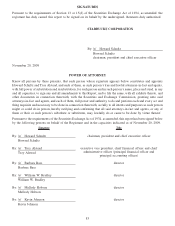Starbucks 2009 Annual Report Download - page 81
Download and view the complete annual report
Please find page 81 of the 2009 Starbucks annual report below. You can navigate through the pages in the report by either clicking on the pages listed below, or by using the keyword search tool below to find specific information within the annual report.
loans, including accrued interest and fees, have been paid in full. The Company’s maximum exposure under this
commitment is disclosed in the table below and is limited to the sum of unpaid principal and interest, as well as other
related expenses. These amounts will vary based on fluctuations in the yen foreign exchange rate.
Starbucks has commitments under which it unconditionally guarantees its proportionate share of certain borrowings
of unconsolidated equity investees. The Company’s maximum exposure under these commitments disclosed in the
table below excludes interest and other related costs. The fair value of these guarantees is included in Equity and
cost investments and Other accrued expenses on the consolidated balance sheets.
The following table presents information on unconditional guarantees as of September 27, 2009 (in millions):
Maximum
Exposure Year Guarantee
Expires in
Estimated Fair Value
Recorded on
Balance Sheet
Japanese yen-denominated bank loans . ................ $ 2.9 2014 $ —
(1)
Borrowings of other unconsolidated equity investees ....... $17.9 2009 to 2012 $3.7
(1)
Since there has been no modification of these loan guarantees subsequent to the Company’s adoption of
accounting requirements for guarantees, Starbucks has applied the disclosure provisions only and has not
recorded the guarantees on its consolidated balance sheets.
Legal Proceedings
On October 8, 2004, a former hourly employee of the Company filed a lawsuit in San Diego County Superior Court
entitled Jou Chau v. Starbucks Coffee Company. The lawsuit alleged that the Company violated the California Labor
Code by allowing shift supervisors to receive tips. More specifically, the lawsuit alleged that since shift supervisors
direct the work of baristas, they qualify as “agents” of the Company and are therefore excluded from receiving tips
under California Labor Code Section 351, which prohibits employers and their agents from collecting or receiving
tips left by patrons for other employees. The lawsuit further alleges that because the tipping practices violated the
Labor Code, they were unfair practices under the California Unfair Competition Law. On February 28, 2008, the
trial court ruled against the Company in the liability phase of the trial and on March 20, 2008 the court ordered the
Company to pay approximately $87 million in restitution, plus interest. The Company appealed the decision of the
trial court and on June 2, 2009 the California Court of Appeal reversed the trial court’s judgment in its entirety and
ruled in favor of Starbucks. The Court of Appeal denied plaintiffs’ petition for rehearing and reaffirmed its ruling on
July 2, 2009. The plaintiffs filed a petition for review with the California Supreme Court on July 13, 2009. The
California Supreme Court denied plaintiffs’ petition for review. The trial court has been ordered to enter judgment
for Starbucks and dismiss the case.
On June 30, 2005, three individuals, Erik Lords, Hon Yeung, and Donald Brown filed a lawsuit in Orange County
Superior Court, California. The lawsuit alleged that the Company violated the California Labor Code section 432.8
by asking job applicants to disclose at the time of application convictions for marijuana related offenses more than
two years old. The California Court of Appeal issued a ruling on December 10, 2008 instructing the trial judge to
enter summary judgment against plaintiffs and the California Supreme Court has rejected the plaintiffs’ appeal. The
matter is now back before the trial court awaiting final dismissal.
The Company is party to various other legal proceedings arising in the ordinary course of its business, but it is not
currently a party to any legal proceeding that management believes would have a material adverse effect on the
consolidated financial position or results of operations of the Company.
Note 18: Segment Reporting
Segment information is prepared on the same basis that the Company’s management reviews financial information
for operational decision making purposes. Starbucks has three reportable operating segments: US, International and
CPG. In the fourth fiscal quarter of 2009, the Company changed the composition of its reportable segments. The US
foodservice business, which was previously reported in the US segment, is now reported in the CPG segment, as a
73


